Related Research Articles
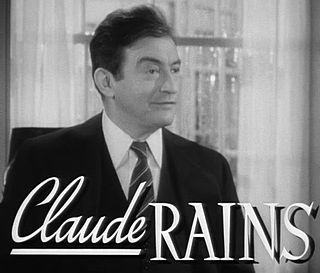
William Claude Rains was a British and American actor whose career spanned almost seven decades. After his American film debut as Dr. Jack Griffin in The Invisible Man (1933), he appeared in The Adventures of Robin Hood (1938), Mr. Smith Goes to Washington (1939), The Wolf Man (1941), Casablanca (1942), Kings Row (1942), Notorious (1946), Lawrence of Arabia (1962), and The Greatest Story Ever Told (1965).
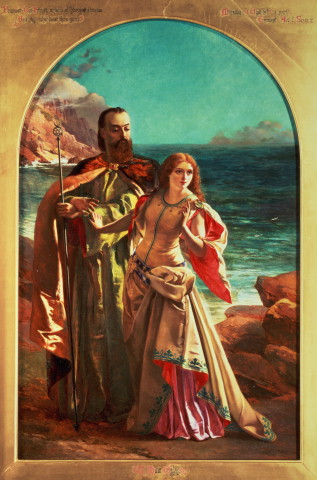
Prospero is a fictional character and the protagonist of William Shakespeare's play The Tempest. Prospero is the rightful Duke of Milan, whose usurping brother, Antonio, had put him to sea on a "rotten carcass" of a boat to die, twelve years before the play begins. Prospero and Miranda had survived and found exile on a small island. He has learned sorcery from books, and uses it while on the island to protect Miranda and control the other characters.
Sir Ralph David Richardson was an English actor who, with John Gielgud and Laurence Olivier, was one of the trinity of male actors who dominated the British stage for much of the 20th century. He worked in films throughout most of his career, and played more than sixty cinema roles. From an artistic but not theatrical background, Richardson had no thought of a stage career until a production of Hamlet in Brighton inspired him to become an actor. He learned his craft in the 1920s with a touring company and later the Birmingham Repertory Theatre. In 1931 he joined the Old Vic, playing mostly Shakespearean roles. He led the company the following season, succeeding Gielgud, who had taught him much about stage technique. After he left the company, a series of leading roles took him to stardom in the West End and on Broadway.

Sir Arthur John Gielgud, was an English actor and theatre director whose career spanned eight decades. With Ralph Richardson and Laurence Olivier, he was one of the trinity of actors who dominated the British stage for much of the 20th century. A member of the Terry family theatrical dynasty, he gained his first paid acting work as a junior member of his cousin Phyllis Neilson-Terry's company in 1922. After studying at the Royal Academy of Dramatic Art (RADA), he worked in repertory theatre and in the West End before establishing himself at the Old Vic as an exponent of Shakespeare in 1929–31.

Peter Stephen Paul Brook was an English theatre and film director. He worked first in England, from 1945 at the Birmingham Repertory Theatre, from 1947 at the Royal Opera House, and from 1962 for the Royal Shakespeare Company (RSC). With them, he directed the first English-language production in 1964 of Marat/Sade by Peter Weiss, which was transferred to Broadway in 1965 and won the Tony Award for Best Play, and Brook was named Best Director. He also directed films such as an iconic version of Lord of the Flies in 1963.

Dame Edith Mary Evans, was an English actress. She was best known for her work on the stage, but also appeared in films at the beginning and towards the end of her career. Between 1964 and 1968, she was nominated for three Academy Awards.
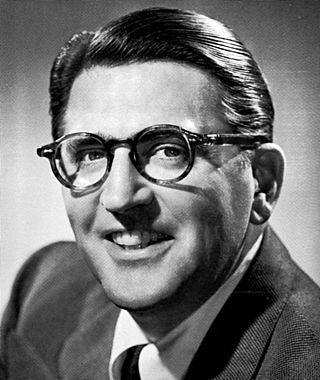
Robert Reiniger Meredith Willson was an American flutist, composer, conductor, musical arranger, bandleader, playwright, and writer. He is perhaps best known for writing the book, music, and lyrics for the 1957 hit Broadway musical The Music Man and "It's Beginning to Look a Lot Like Christmas" (1951). Willson wrote three other musicals, two of which appeared on Broadway, and composed symphonies and popular songs. He was twice nominated for Academy Awards for film scores.
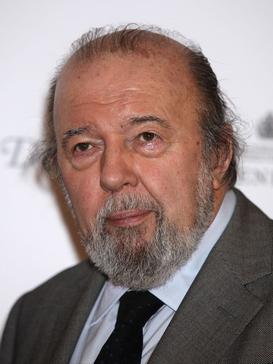
Sir Peter Reginald Frederick Hall CBE was an English theatre, opera and film director. His obituary in The Times declared him "the most important figure in British theatre for half a century" and on his death, a Royal National Theatre statement declared that Hall's "influence on the artistic life of Britain in the 20th century was unparalleled". In 2018, the Laurence Olivier Awards, recognising achievements in London theatre, changed the award for Best Director to the Sir Peter Hall Award for Best Director.

The Noël Coward Theatre, formerly known as the Albery Theatre, is a West End theatre in St. Martin's Lane in the City of Westminster, London. It opened on 12 March 1903 as the New Theatre and was built by Sir Charles Wyndham behind Wyndham's Theatre which was completed in 1899. The building was designed by the architect W. G. R. Sprague with an exterior in the classical style and an interior in the Rococo style.

Lois Maureen Stapleton was an American actress. She received numerous accolades, including an Academy Award, a Golden Globe Award, a BAFTA Award, a Primetime Emmy Award, and two Tony Awards, in addition to a nomination for a Grammy Award.
Roscoe Lee Browne was an American actor and director. He resisted playing stereotypically black roles, instead performing in several productions with New York City's Shakespeare Festival Theater, Leland Hayward's satirical NBC series That Was the Week That Was, and a poetry performance tour of the United States in addition to his work in television and film. He is perhaps best known for his many guest appearances on TV series from the 1970s and 1980s as well as movies like The Cowboys (1972) with John Wayne.

Brian Bedford was an English actor. He appeared in film and on stage, and was an actor-director of Shakespeare productions. Bedford was nominated for seven Tony Awards for his theatrical work, winning once.
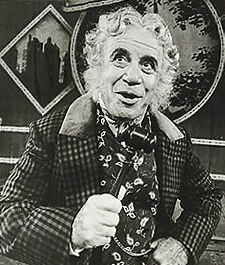
George Walter Rose was an English actor and singer in theatre and film. He won the Tony Award for Best Actor in a Musical for roles in My Fair Lady and The Mystery of Edwin Drood.

Irene Worth, CBE, born Harriett Elizabeth Abrams, was an American stage and screen actress who became one of the leading stars of the British and American theatre. She pronounced her given name with three syllables: "I-REE-nee".

Acting Shakespeare is a one-man show of Shakespearean monologues interspersed with theatrical anecdotes devised and performed by Ian McKellen. McKellen first performed the recital in Scandinavia in 1980 and later performed it throughout the world. It was broadcast by PBS in 1982. For the 1984 Broadway engagement, McKellen received the Drama Desk Award for Outstanding One-Person Show and a Tony Award nomination. He received internationally rave reviews with some calling him "The new Olivier" and "The greatest classical actor of our generation". The most recent performance was in Jersey Opera House in 1990, until its revival in 2022 by the Irvington Shakespeare Company.
Richard Burton's Hamlet is a common name for both the Broadway production of William Shakespeare's tragedy that played from April 9 to August 8, 1964 at the Lunt-Fontanne Theatre, and for the filmed record of it that has been released theatrically and on home video.
A spoken word album is a recording of spoken material, a predecessor of the contemporary audiobook genre. Rather than featuring music or songs, the content of spoken word albums include political speeches, dramatic readings of historical documents, dialogue from a film soundtrack, dramatized versions of literary classics, stories for children, comedic material, and instructional recordings. The Grammy for Best Spoken Word Album has been awarded annually since 1959.
Motley was the name of the theatre design firm made up of three English designers: sisters Margaret and Sophie Harris (1900–1966) and Elizabeth Montgomery (1902–1993).

A Man for All Seasons is a play by Robert Bolt based on the life of Sir Thomas More. An early form of the play had been written for BBC Radio in 1954, and a one-hour live television version starring Bernard Hepton was produced in 1957 by the BBC, but after Bolt's success with The Flowering Cherry, he reworked it for the stage.

Phyllis Neilson-Terry was an English actress. She was a member of the third generation of the theatrical dynasty the Terry family. After early successes in the classics, including several leading Shakespearean roles, she spent more than four years in the US, in generally lightweight presentations.
References
- ↑ "Ages of Man (Original Broadway Cast Recording)". The Official Masterworks Broadway Site. Retrieved 10 October 2022.
- ↑ Gans, Andrew (25 April 2017). "John Gielgud's Ages of Man Tony Award Will Be Auctioned". Playbill. Retrieved 10 October 2022.